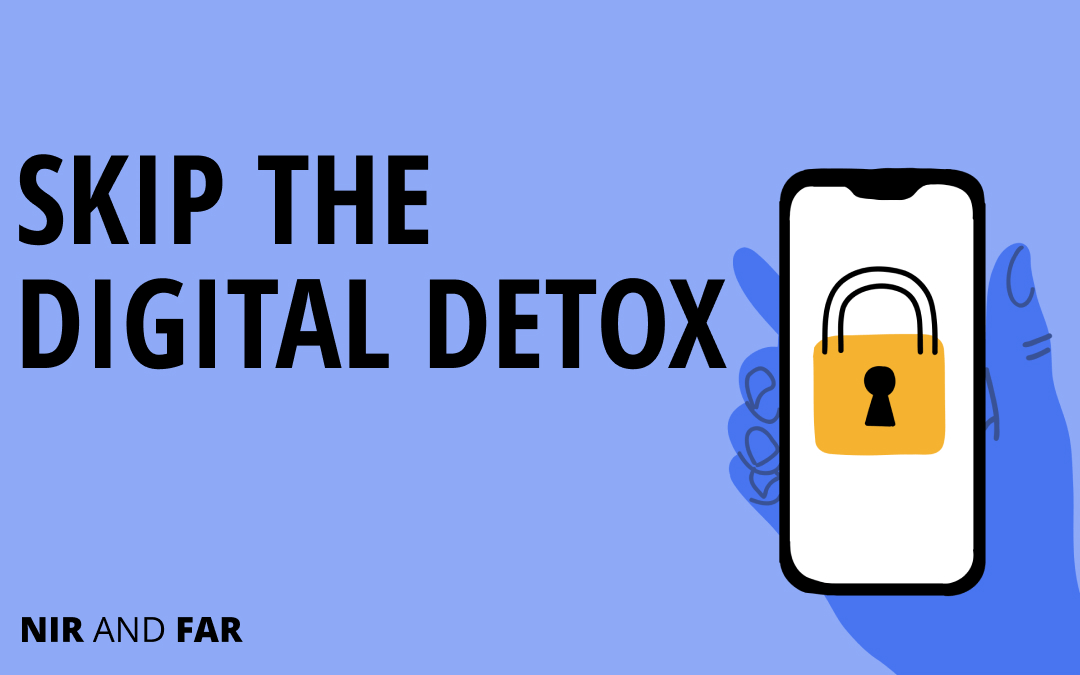I once tried a digital detox. It failed miserably.
When I realized I was distracted during quality time with my daughter, I blamed my smartphone and made some extreme changes.
I replaced my smartphone with an old-school flip phone so I couldn’t be tempted to use email, Instagram, and Twitter. But I found it too difficult to get around without GPS and the addresses saved inside my calendar app. I missed listening to audiobooks while I walked, as well as all the other handy things my smartphone could do.
That digital detox didn’t help me get any better at managing my distraction. And in a recently published study, participants who tried a digital detox experienced the same issues I did.
One might think, given all the bad press about so-called “smartphone addiction,” that using no technology would be the right cure.
But the study instead found that reducing daily smartphone use by one hour led to far more sustainable results.
Reducing Screen Time Beats Cutting It Out Altogether
The study, published in the Journal of Experimental Psychology, separated 619 participants into three groups that abided by specific smartphone-use guidelines for seven days: a control group that used smartphones as usual, a group that abstained from all smartphone use, and a group that reduced daily smartphone use by one hour.
Participants completed online surveys at four points during the study: before the week-long intervention, one day after the intervention, one month after the intervention, and four months after the intervention.
Here are the findings:
- While the abstinence group did see positive results, they didn’t last, suggesting that a digital detox is nothing more than a quick fix. Reduction in smartphone use, however, leads to sustainable positive results.
- Four months after the intervention, daily initial smartphone use time was reduced by about 38 minutes in the abstinence group and by about 45 minutes in the reduction group. Both groups also saw lower smartphone use intensity, problematic use tendencies, depressive and anxiety symptoms, and higher life satisfaction and physical activity—but the effects of nearly all were larger and more stable in the reduction group over four months.
- Surprisingly, smokers in the reduction group saw a long-term decrease in smoking behavior, whereas there were no changes in smoking within the abstinence group.
Why would moderating smartphone use affect smoking? My guess is that the reduction group experienced a feeling of agency and control by cutting back screen time, a sense of “I can do this!” The relatively easy step of cutting back a bit might have made them better able to cope with the urge to smoke by making them believe they were more powerful than they thought. The abstinence group was not getting the same feeling of self-efficacy since their challenge was binary.
In fact, a reduction in smartphone use had such a significant correlation to well-being that the study authors recommended it be incorporated into intervention programs aiming to enhance physical activity or reduce smoking behavior.
It’s also worth noting that the present compliance rate was slightly higher in the reduction group than in the abstinence group and that the reduction group had the lowest dropout rate.
Why did reducing smartphone use garner better results than a digital detox? The answer is manifold, but much of it comes down to our ability to control our attention and manage our time.
It comes down to learning how to use the tools as opposed to letting the tools use us.
Find a Better Relationship with Your Smartphone
Let’s face it: Smartphones are a necessity in today’s world.
We use them not just as phones but also as alarm clocks, navigation systems, e-book readers, cameras, and social tools. Maintaining long-term abstinence, as the study acknowledges, is simply impractical. Depriving yourself of online social interaction over a longer period of time can negatively impact your well-being.
Reducing smartphone use doesn’t require such an abrupt and limiting lifestyle change. The study authors wrote:
The limitation of daily smartphone time can foster a more conscious and efficient handling…, and reduce the “just to beat boredom” use. Time spent on smartphone use may become more appreciated. Furthermore, the limitation provides smartphone-free time for offline activities, their conscious perception, and enjoyment.
They go on to say that “the restricted online time enabled participants to consider functional coping strategies such as a direct facing of daily challenges, and provided time to consciously enjoy offline social interactions without a permanent disruption by smartphone use.”
Simply put, participants who reduced their smartphone use had to exercise their own agency and control. They were forced to build up what I consider to be the most important skill of the 21st century: how to be Indistractable.
The study noted that breaking the “vicious cycle” of smartphone use requires external support, which its regular surveys and compliance diaries for participants provided. These surveys and compliance diaries act much the way timeboxing and tracking internal triggers do in my recommended steps to take to break the vicious cycle of distraction.
So, the next time your weekly screen time summary makes you gasp in horror, don’t listen to the gut reaction to turn off your phone and hide it in a drawer. Let’s not moralize and medicalize the issue unnecessarily.
Instead, consider whether you’re spending time with your device in a way that matches your values, not the tech company’s.
Related Articles
- Schedule Maker: a Google Sheet to Plan Your Week
- Habit Tracker Template in Google Sheets
- The Ultimate Core Values List: Your Guide to Personal Growth
- Timeboxing: Why It Works and How to Get Started in 2025
- An Illustrated Guide to the 4 Types of Liars
- Hyperbolic Discounting: Why You Make Terrible Life Choices
- Happiness Hack: This One Ritual Made Me Much Happier

